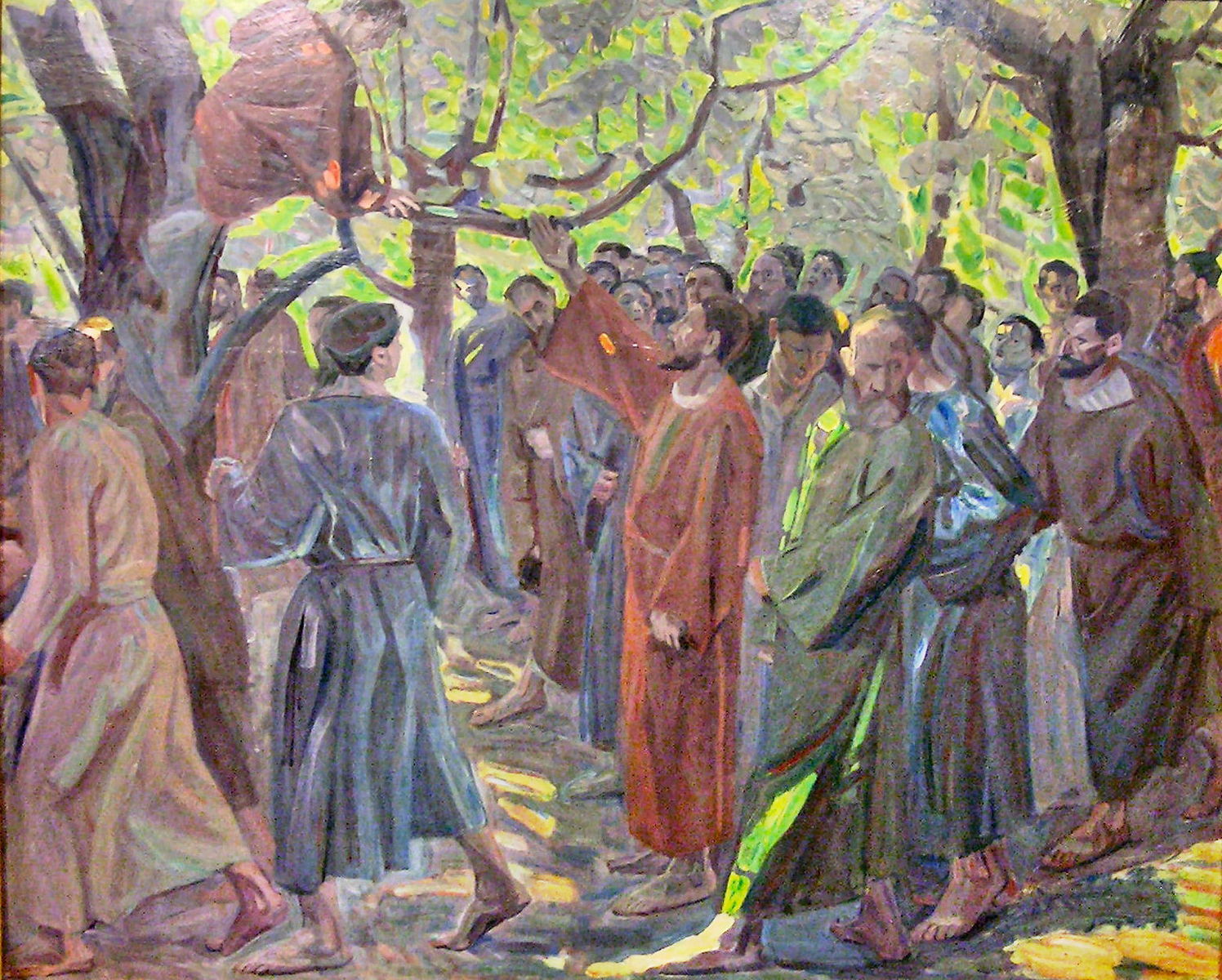Of all the Gospel passages that I have found helpful in ministry with LGBTQ people, the beautiful story of Zacchaeus—has been the most meaningful for me (Lk 19: 1-10).
At first glance, the story of Jesus’s encounter with the tax collector in Jericho would seem to have little to do with LGBTQ people today. But if you read it carefully, this passage from Luke’s Gospel, a masterpiece of storytelling, has a great deal to say about all those who find themselves marginalized.
Now I don’t want to imply that LGBTQ people are always and everywhere “marginalized.” But it’s fair to say that in the Catholic Church many of them feel that way. So as we read the Gospel, I would like to invite you to see Zacchaeus as an emblem of the LGBTQ person. Notice all the subtle resonances in the story.
To begin with, Luke tells us that Zacchaeus is the “chief tax collector” in Jericho. Now, that would have meant that he was probably “on the outs” with most of the people in this predominantly Jewish town, not only because he was colluding with the Roman authorities, but also because tax collectors had the reputation of skimming money off the top.
My old New Testament professor Daniel J. Harrington, SJ, used to say that when we read “chief tax collector” here, we should think “chief sinner.” But by using Zacchaeus as a way of seeing the LGBTQ person, I’m not saying LGBTQ people are any more sinful than anyone else–we’re all sinners in one way or another. Rather, they often feel “on the outs,” especially in the church. Like Zacchaeus probably did in Jericho.
At the beginning of the story, Zacchaeus is described as “short in stature.” Luke means that he was physically small. But how little “stature” do LGBTQ people have in the church today? They are often ignored, excluded, not listened to. And, says Luke, Zacchaeus couldn’t see Jesus “because of the crowd.” Again, that means that he couldn’t see over their heads, but how often does “the crowd” get in the way of LGBTQ people encountering God? How often are we part of “the crowd” that prevents people with “little stature” from coming to know God? How often is the church part of “the crowd”?
So what does Zacchaeus do? He climbs a sycamore tree. (The homey touch of identifying the precise type of tree gives this story an added sense of historicity.) Why does he climb a tree? Because he wanted to “see Jesus.” (The original Greek is even more moving: he wanted “to see who Jesus was.”) That’s what LGBTQ Catholics want today as well: to “see Jesus.” But the crowd often gets in the way. So they must do something extra—go out on a limb—just to see what everyone else sees.
“At first glance, the story of Jesus’s encounter with the tax collector in Jericho would seem to have little to do with LGBTQ people. But if you read it carefully, this passage from Luke’s Gospel, a masterpiece of storytelling, has a great deal to say about all those who find themselves marginalized.”
As Jesus is passing through Jericho (with what would probably have been a sizeable crowd, since this story comes towards the end of his public ministry) he spies the diminutive tax collector perched high in the sycamore tree. Jesus then invites himself to the man’s house, a public sign of welcome. “Zacchaeus,” says Jesus, “come down quickly, for today I must stay at your house!” Jesus is offering him what New Testament scholars call “table fellowship.”
Then comes my favorite line in the story: “When they all saw this, they began to grumble.” The Greek word used here is panta, all, which would have included the disciples as well. All began to grumble. Why? Because showing mercy to those on the margins always infuriates some people. It did in Jesus’s time and it does in ours.
So the next time you see someone opposing mercy to LGBTQ people, remember this line: “They began to grumble.”
But that does not deter Zacchaeus at all. He shinnies down the tree and “stands there” (the Greek word used has the implication of “standing one’s ground”). And he receives Jesus “with joy.” Of course! How joyful it is to be welcomed into the community! Many LGBTQ people know the joy of finally feeling welcomed.
Then Zacchaeus makes a public declaration: If he has defrauded anyone, he will repay them four times over and he will give half his money to the poor. This is usually considered to be Zacchaeus’s conversion, from whatever sins he had committed. And indeed, in the Gospels, any encounter with Jesus provokes a conversion. (By the way, I’m not alluding to “conversion therapy,” but rather to metanoia, the word Jesus used for the change of mind and heart that we are all called to.)
But recently I discovered something surprising about this Gospel passage. The English translation that we use at Mass, from the New American Bible, is this: “Half of my possessions, Lord, I shall give to the poor.” But the original Greek is in the present tense: “I give (or am giving) half of my possessions to the poor.” Zacchaeus seems to be already doing that.
In other words, the conversion that is occurring may be not only Zacchaeus’s conversion, but the crowd’s conversion as well, as Jesus reveals to them that the one who was on the “outside” is more generous than they had ever imagined. How often is that the case with LGBTQ people, after people in the church come to know them!
At the end of the story, Jesus calls Zacchaeus a “Son of Abraham.” It’s a phrase that would have resonated deeply with the Jewish crowd. Later in Luke, Jesus calls the woman who was “bent over” the “Daughter of Abraham” after he has healed her (13:16). In both cases, Jesus is reminding the crowd that “they” are part of “us.”
In this beautiful Gospel narrative, Jesus has demonstrated his inclusion of Zacchaeus not only by inviting himself to dine at his house, but by using the phrase “Son of Abraham,” which tells the crowd explicitly, “This man is one of us.”
So it seems to me that there are two places we can stand regarding ministry to LGBTQ people and indeed any who feel on the margins. You can stand with the crowd who “grumbles.” Or you can stand with Jesus.
This meditation is from Outreach’s Sunday Gospel reflection and newsletter. If you’d like to receive a reflection every week (for free) just sign up here.




Your reflection on Zacchaeus only reinforces for me God’s huge heart where there is room for everyone, even the grumblers! How many times have we found ourselves in both positions, standing with the grumblers AND/OR on the “outs”. The story speaks so beautifully of God’s goodness, forgiveness and wholeheartedly accepting each and every one of us, because we are wonderfully and beautifully made. Pray God we are always open to the wonder of metanoia, for with God, all things are possible
Thank you, Cathe! Yes, God accepts each and everyone of us, all of us called to “metanoia” with our encounters with the Lord.
We are all made in God’s image and likeness whatever our gender or sexual identities. God doesn’t make mistakes and all should be welcome in our church if we are truly followers of Jesus. Thank you for your reflection as the mother of a gay child I pray our church will be more welcoming. I live in a very conservative area and Bible study group I have attended is composed of many different denominations. Most in the group are very anti gay. I stir the pot every so often
Dear Catb: Thanks for your message and most of all for being a loving parent.
Fr. Martin,
As a proud parent of a transgender (adult) child, I find myself grateful for your ministry, daily.
As a cradle Catholic, I experience an almost indescribable tension between the teachings of Jesus of Nazareth and the institutional Church when it comes to the inclusion of our LBGTQIA+ brothers and sisters.
The Church seems intent on ignoring anthropology, biology, and psychology; the advancement of science in these areas. The flat earth approach is life threatening to families like ours.
His commandment was to love one another. Full stop.
God bless you, Fr. Martin.
Mary. our Mother, pray for us.
-Duane Sherry (he/him)
Dear Duane:
Many thanks for your kind note and your prayers.
Most of all, thanks for being a loving parent!
Peace,
Jim
I have been a Catholic nun for 58 years. I’m really appreciating your new email news letter.
My personal belief is that people who say such negative and ugly remarks about the LGBTQ community have probably never known anyone from that community.
My brother and his husband are wonderful, kind and loving men. Another couple I know have twin boys and definitely qualify as “Fathers of the Year.” And another gay couple, who are actors, have deep roots in their Catholic Faith – while longing to attend a Church where they will be accepted w/o prejudice — and the list could go on.
So, thank you, Father Martin, for being their voice and affirming once again how we must love all people as God loves us.
Sr. Christine Setticase, fsp
Thank you Sister!
I have been a Catholic nun for 58 years. I’m really appreciating your new email news letter.
My personal belief is that people who say such negative and ugly remarks about the LGBTQ community have probably never known anyone from that community.
My brother and his husband are wonderful, kind and loving men. Another couple I know have twin boys and definitely qualify as “Fathers of the Year.” And another gay couple, who are actors, have deep roots in their Catholic Faith – while longing to attend a Church where they will be accepted without prejudice — and the list could go on.
So, thank you, Father Martin, for being their voice and affirming once again how we must love all people as God loves us.
Sr. Christine Setticase, fsp